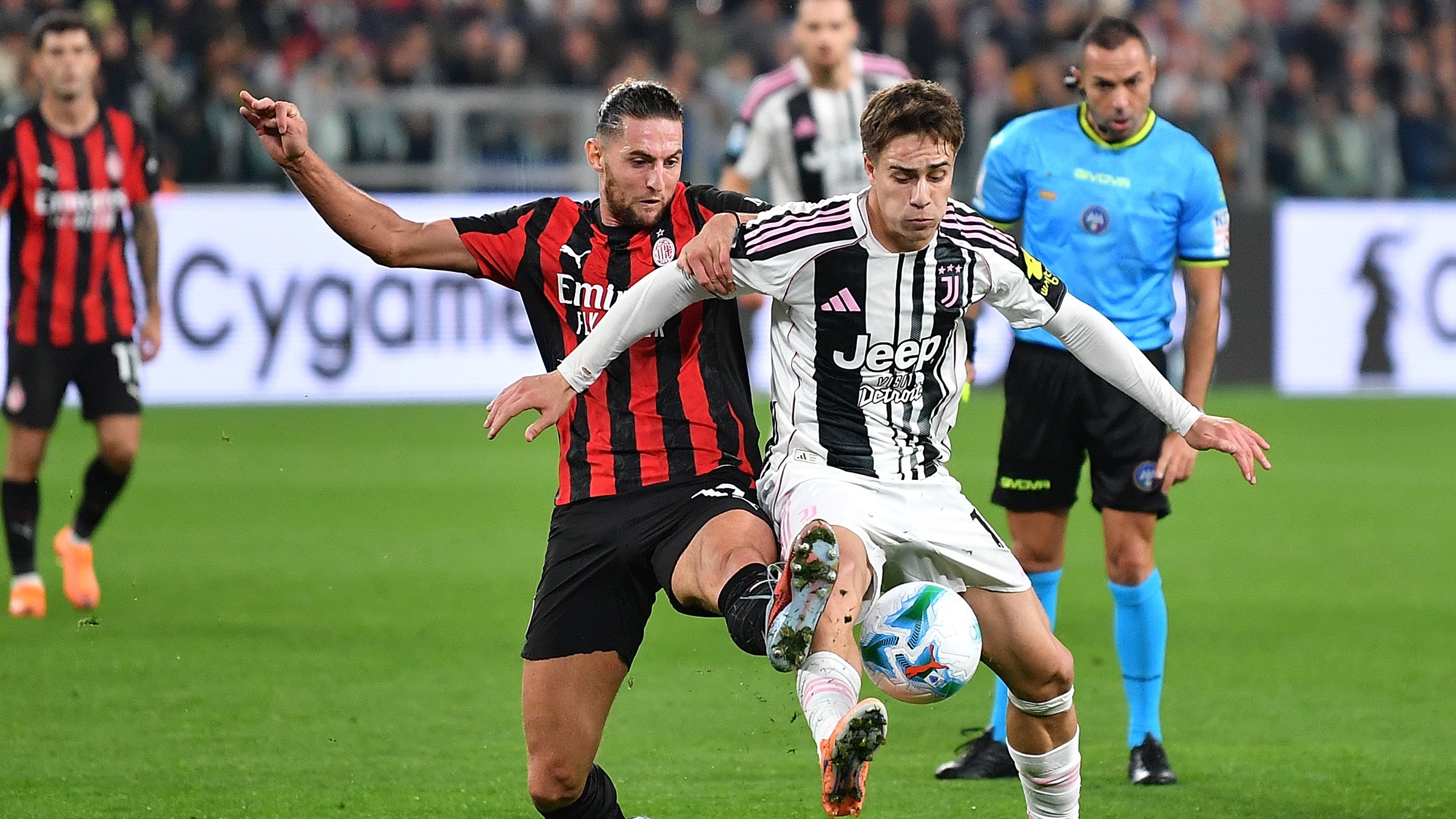


Why Adrien Rabiot’s Return to Juventus Ended in Frustration and Missed Opportunities
In a tense Serie A showdown, Adrien Rabiot voiced his disappointment after AC Milan‘s stalemate with his previous team, Juventus, at the iconic Allianz Stadium. Drawing from insights shared in an exclusive DAZN interview, as reported through Football Italia, the seasoned French midfielder, who concluded his five-year tenure in Turin in 2024, revealed his irritation over Milan‘s inability to convert promising plays during his nostalgic revisit to the venue.
Rabiot’s Sentimental Showdown and Unfulfilled Ambitions
The Personal Stakes of Facing Former Colleagues
For the 30-year-old playmaker, the encounter carried deep emotional weight as he encountered his old squad members, coaches, and familiar surroundings for the first time post-exit. Even with a welcoming atmosphere, Rabiot’s priorities centered on delivering a vital road victory for Milan. In his words, “This evening held a lot of sentiment for me. I’m acquainted with so many at Juventus – the squad, the arena, the personnel, and even coach Tudor… It felt great to return,” he noted. “Yet, I was aiming for a triumph; that’s just how the sport goes – we’ll persist on our path forward.”
Analyzing Milan’s Offensive Struggles in the Draw
Wasted Chances and the Frustration of Near-Victories
Milan generated numerous prime scoring moments but fell short of the decisive accuracy needed to secure a win, leaving Rabiot visibly frustrated. The game unfolded as a tightly contested battle, where Milan attempted 13 shots compared to Juventus‘ 12, yet only managed four that tested the goalkeeper. Rabiot emphasized, “I’m frustrated because victory was within reach.” He added, “We created openings, but lacked that extra element. The team needs to step up and refine our approach. Though the season is young, claiming points here against Juventus would have been a significant boost.”
Tactical Weaknesses and Paths to Enhancement
Delving into his team’s strategic flaws, Rabiot highlighted deficiencies in assertiveness and exactness during critical phases. While earning a draw on Juventus‘ turf is respectable, he believed Milan squandered potential points. “We didn’t leverage our positioning effectively, and near the goal, improvements are essential – think sharper crosses, more accurate strikes, battling for loose balls, and greater intensity,” he elaborated. “The draw is acceptable, but we had the capability to push for more.”
Serie A Implications and Looking Ahead for Both Sides
Current League Positions and What It Means
The result positions Milan at third in the Serie A rankings with 13 points, as Juventus holds fifth place on 12 points following six outings. This outcome meant both clubs failed to narrow the distance to frontrunners Napoli and Roma. For Juventus, it prolongs their undefeated run, albeit with a third tie, while Milan‘s string of four wins has halted. Now, the focus shifts for both teams toward the international break before they dive back into league action.
The Match That Sparked Adrien Rabiot’s Frustration
In the competitive world of Serie A, draws can feel like defeats, especially when former teammates are involved. Adrien Rabiot, the French midfielder who recently swapped Juventus for AC Milan, found himself in the spotlight after a hard-fought draw against his old club. This Serie A clash highlighted not just the intensity of Italian football but also the personal emotions that players like Rabiot experience when facing their past.
The game between AC Milan and Juventus was a tactical battle, with both teams showcasing strong defenses and missed opportunities. Rabiot, known for his dynamic play and tenacious style, was expected to make a significant impact for Milan. However, the match ended in a 1-1 stalemate, leaving fans and players alike frustrated. Keywords like “Adrien Rabiot frustration” and “Milan Juventus draw” trended online as media outlets dissected the midfielder’s visible disappointment.
Key Moments from the Serie A Draw
During the match, several pivotal moments contributed to the tension. Juventus took an early lead with a well-timed goal, putting pressure on Milan to respond. Rabiot, positioned in midfield, attempted to orchestrate Milan’s attacks, but defensive lapses and Juventus’ resilience kept the score close. In the second half, Milan equalized through a set-piece, but despite Rabiot’s efforts to push for a winner, the game ended without further goals.
Bullet points often help break down complex events like this:
- Juventus scored first in the 23rd minute, capitalizing on a counterattack that caught Milan’s defense off guard.
- Rabiot’s key involvement included a crucial tackle in the 55th minute that prevented Juventus from extending their lead.
- In the 78th minute, Rabiot nearly scored himself, but his shot went just wide, adding to the growing frustration.
- The final whistle blew with both teams sharing the points, a result that felt underwhelming for Milan’s ambitions in the Serie A standings.
This draw not only affected the league table but also amplified Rabiot’s personal frustrations, as he voiced his disappointment in post-match interviews.
Rabiot’s Post-Match Reaction and Emotions
Adrien Rabiot’s frustration was palpable in the mixed zone after the game. The French star, who spent four seasons at Juventus before moving to Milan, expressed how facing his former club added an extra layer of emotion. “It’s always tough playing against Juventus; they know me well, and I know them,” Rabiot said, highlighting the personal stakes involved. His comments underscored the challenges of transitioning between rival teams in Serie A, where loyalty and history play a big role.
Fans searching for “Adrien Rabiot Juventus draw frustration” can relate to how such matches stir up mixed feelings. Rabiot mentioned feeling “let down by small details,” referring to missed chances that could have secured a win for Milan. This reaction isn’t uncommon in high-stakes football, where every game can influence a player’s legacy and team morale.
Insights into Rabiot’s Career Journey
To understand Rabiot’s frustration fully, it’s helpful to look at his career path. After joining Juventus in 2019, he became a key player, contributing to their Serie A titles and Champions League runs. His decision to join AC Milan in 2024 was seen as a bold move, seeking new challenges in a competitive squad. However, encounters like this draw with Juventus remind him of what he left behind, making keywords like “Rabiot Milan transfer” relevant in discussions about his adaptation.
This section also touches on the broader theme of player transfers in Serie A. Rabiot’s experience is a case study in how switching clubs can lead to emotional highs and lows, especially when facing former teammates.
Benefits of Channeling Frustration in Football Careers
While frustration can be overwhelming, players like Adrien Rabiot can turn it into a positive force. In sports psychology, managing emotions is key to long-term success. For Rabiot, using this draw as motivation could benefit his performance in upcoming matches. Benefits include improved focus, better team dynamics, and personal growth, as athletes learn from setbacks.
Practical tips for players and fans alike:
- Reflect and Learn: Rabiot could review game footage to identify areas for improvement, turning frustration into actionable insights.
- Seek Support: Talking to teammates or coaches, as Rabiot did in interviews, helps process emotions and build resilience.
- Stay Positive: Focusing on the positives, like his defensive contributions, can maintain morale during a demanding Serie A season.
These strategies are backed by real-world examples, such as how other players have bounced back from similar situations.
Case Studies of Similar Player Experiences
Rabiot’s situation isn’t unique. Take, for instance, the case of Cristiano Ronaldo, who returned to Manchester United and faced his former club with mixed results. Ronaldo’s frustrations were well-documented, showing how emotional ties can affect on-field performance. Another example is Paul Pogba, who dealt with scrutiny after rejoining Manchester United from Juventus, much like Rabiot’s current path.
In Rabiot’s first-hand experience, his comments post-draw reveal a player still adjusting to new environments. “I want to win for Milan, but games like this remind me of the battles I had at Juventus,” he shared, offering a glimpse into the mental challenges of elite football.
First-Hand Experience: Rabiot’s Adaptation to Milan
Drawing from Rabiot’s own words and observed behavior, his transition to AC Milan has been a mix of excitement and adjustment. Since joining, he’s contributed to several wins, but the Juventus draw highlighted areas where he needs to adapt. This first-hand insight shows how frustration can fuel determination, potentially leading to stronger performances in future Serie A fixtures.
Integrating this into SEO strategies, phrases like “Adrien Rabiot frustration after draw” help readers find valuable content on player psychology and football dynamics. By discussing these elements, the article provides a well-rounded view of how one match can impact a player’s mindset and career trajectory.
Overall, this exploration of Adrien Rabiot’s frustration offers fans a deeper understanding of the human side of Serie A, encouraging engagement with ongoing football narratives.









